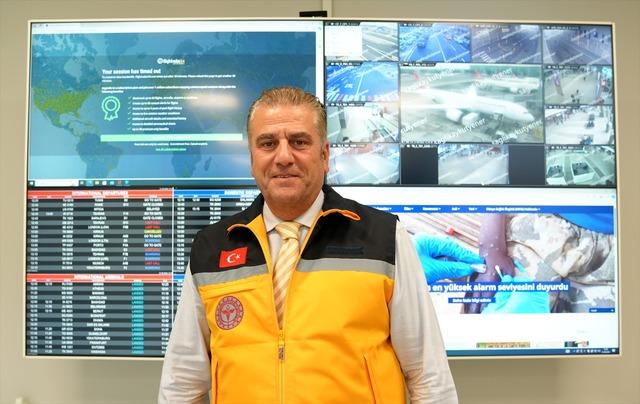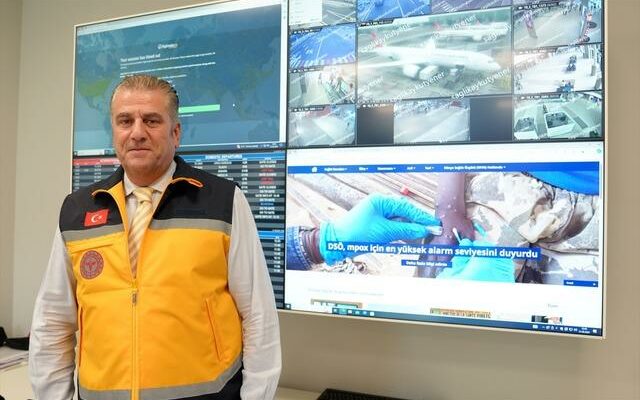The M pox virus, which was declared a public health emergency of international importance by the World Health Organization (WHO) due to its rapid spread and deaths especially in the Democratic Republic of the Congo, has also been seen in Burundi, the Central African Republic, Congo, Cameroon, Ghana, Liberia, Nigeria, Rwanda, Kenya, Ivory Coast and South Africa on the African continent.
The Turkish Border and Coast Health General Directorate has taken some precautions against the virus at Istanbul Airport. In particular, flights from the Democratic Republic of Congo, where the disease is most prevalent, and 11 surrounding countries, and passengers entering Turkey are being closely monitored.
“WE ARE KEEPING SUSPICIOUS CASES IN OUR ISOLATED AREAS”
Answering AA correspondent’s questions regarding the precautions taken at the airport, Dr. Aykut Yener Kavak, Chief Physician of Istanbul Airport of the General Directorate of Health for Turkish Borders and Coasts, said that they started monitoring the flights after the WHO declared the disease a global emergency.
Kavak emphasized that there is a health team working 24/7 at Istanbul Airport and that all inspections are carried out meticulously, and said:
“We go to the gates of the planes coming from Democratic Congo and make inquiries. We ask whether there are any passengers who have any illnesses, rashes or fevers during the trip. In addition, we follow the flights of 11 neighboring countries online. In case of any suspicious situation, the necessary checks are made on these planes. We have not encountered any monkeypox cases at Istanbul Airport so far. From time to time, suspicious passengers who were thought to be possible came to our attention and these passengers were examined. Since we did not think that any of these passengers had monkeypox, we allowed them to travel.”

Kavak, who stated that the biggest criterion in diagnosis is the rash, said, “We question the history. Is there any travel from that region or has the person been in that region before? Is there any fever, is there an infection? Also, swelling in the lymph nodes is a symptom of this disease. We keep such suspected cases in our isolated areas, then our health teams perform their examinations.”
Kavak reported that patients with such symptoms will be referred to a previously determined hospital by the health teams in case of suspicion.
Kavak, who stated that they received a lot of questions about the subject from the personnel working in the field, said that they provided information about the disease at the meeting held with the participation of all aviation stakeholders at Istanbul Airport.
“WE ARE A LITTLE MORE COMFORTABLE BECAUSE IT IS NOT TRANSMITTED THROUGH RESPIRATORY TRACT”
Kavak pointed out that when evaluated with scientific data, there is currently no possibility of the disease turning into an epidemic and made the following statements:
“The World Health Organization has already announced this. Since it is not transmitted through the respiratory tract, we are a little more comfortable. The most important way to protect ourselves is to avoid close contact and not to touch people with such lesions with bare hands. It has been published that those with weak immune systems are at risk. Cases heal on their own within 2 to 4 weeks. Our professor, Ateş Kara, stated at the meeting that the smallpox vaccine is 95 percent protective. There is also a monkeypox vaccine in that region. We also hear that vaccination is accelerating in that region.”
Kavak stated that there is no obligation to take precautions such as wearing masks or gloves at airports and airplanes, and noted that the claims made on social media on this issue are unfounded.
Kavak, who stated that they only recommend cleaning staff to use gloves in places like toilets, said, “We want airline staff to pay attention to passengers when boarding the plane. If there is a passenger with such a problem, we want them to inform the local authorities. If there is a patient with similar symptoms during the trip, we request that they inform the air traffic control tower. We want airport staff to inform us when they see patients with lesions.” (AA)
